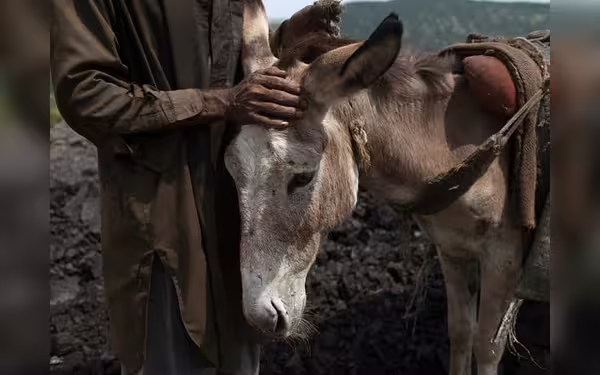Saturday, November 16, 2024 05:50 PM
Donkey Prices Surge in Pakistan Due to Chinese Demand
- Donkey prices reach PKR 300,000 amid rising demand.
- Farmers shift focus from labor to selling donkeys.
- Ethical concerns arise over donkey welfare and exploitation.
 Image Credits: tribune.com.pk
Image Credits: tribune.com.pkThe price of donkeys in Pakistan has surged to PKR 300,000 due to rising demand from China, raising concerns over welfare and rural livelihoods.
The price of donkeys in Pakistan has seen a remarkable increase, with figures soaring to as high as PKR 300,000. This sudden rise can be attributed to a growing demand from China, where donkey hides are highly sought after for their use in cosmetics and medicines. The trend has transformed donkeys into a valuable commodity, especially for those involved in the export of hides to fulfill the requirements of the Chinese market.
Historically, donkeys have been an integral part of rural life in Pakistan, serving as reliable work animals for farmers and laborers. However, the recent surge in prices has shifted the focus from their traditional roles to a more commercial perspective. As the demand for donkey hides continues to climb, many farmers are now considering the financial benefits of selling their animals rather than using them for labor.
This situation raises several important questions. For one, how will this impact the livelihoods of those who depend on donkeys for their daily work? As prices rise, some may be tempted to sell their donkeys, leading to a potential shortage of these animals in rural areas. Additionally, the ethical implications of this trade cannot be overlooked. The welfare of donkeys must be considered, as increased demand could lead to overexploitation and neglect.
Moreover, the rise in donkey prices reflects broader economic trends. It highlights how global demand can influence local markets, often in unexpected ways. As Pakistan navigates this new landscape, it is crucial for stakeholders, including farmers, policymakers, and animal welfare organizations, to engage in discussions about sustainable practices and the future of donkey farming in the country.
While the soaring prices of donkeys may present lucrative opportunities for some, it is essential to approach this situation with caution. Balancing economic interests with the welfare of these animals will be key to ensuring that the benefits of this trend do not come at a significant cost to the communities that have relied on donkeys for generations. As the market evolves, ongoing dialogue and responsible practices will be vital in shaping a sustainable future for both donkeys and their human counterparts in Pakistan.













